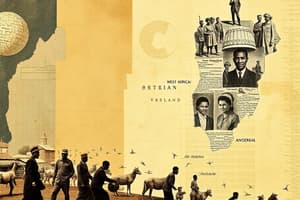Podcast
Questions and Answers
What is the highest point in Nigeria?
What is the highest point in Nigeria?
- Benin Plateau
- Chappal Waddi (correct)
- Osun Osogbo
- Mount Cameroon
What is the official language of Nigeria?
What is the official language of Nigeria?
- Igbo
- Yoruba
- English (correct)
- Hausa
What is the primary driver of Nigeria's economy?
What is the primary driver of Nigeria's economy?
- Manufacturing
- Service sector
- Tourism
- Agriculture (correct)
When did Nigeria gain independence from Britain?
When did Nigeria gain independence from Britain?
What is the name of the insurgency causing security concerns in Nigeria?
What is the name of the insurgency causing security concerns in Nigeria?
What is the approximate population of Nigeria?
What is the approximate population of Nigeria?
Flashcards are hidden until you start studying
Study Notes
Geography and Climate
- Located in West Africa
- Bordered by Chad and Cameroon to the east, Benin to the west, and Niger to the north
- Coastal plains in the south, with a savanna region in the north
- Highest point: Chappal Waddi, 2,419 meters (7,936 ft)
Population and Languages
- Approximately 202 million people (2020 est.)
- Over 250 ethnic groups, with the Hausa-Fulani, Yoruba, and Igbo being the largest
- Official language: English
- Other widely spoken languages: Hausa, Yoruba, Igbo, Fulani
Economy
- Largest economy in West Africa
- Primarily driven by agriculture, with a focus on oil production
- Main exports: petroleum, natural gas, and agricultural products (cocoa, peanuts, cotton)
History
- Ancient civilizations: Nok, Kanem-Bornu, and Hausa city-states
- British colonization (1914-1960)
- Independence from Britain in 1960
- Civil war (1967-1970) and military rule until 1999
- Current government: federal republic with a president and national assembly
Culture
- Rich cultural heritage, with diverse traditional music, art, and literature
- Influenced by Islamic, Christian, and traditional beliefs
- Popular festivals: Eyo, Osun Osogbo, and Argungu Fishing Festival
Challenges
- Corruption and political instability
- Security concerns, including Boko Haram insurgency
- Poverty and inequality, with a significant wealth gap between north and south
- Environmental issues, such as deforestation and oil spills
Geography and Climate
- Located in West Africa, bordered by Chad, Cameroon, Benin, and Niger
- Comprises coastal plains in the south and a savanna region in the north
- Highest point: Chappal Waddi, with an elevation of 2,419 meters (7,936 ft)
Population and Languages
- Approximately 202 million people as of 2020
- Over 250 ethnic groups, with Hausa-Fulani, Yoruba, and Igbo being the largest
- English is the official language
- Hausa, Yoruba, Igbo, and Fulani are other widely spoken languages
Economy
- Largest economy in West Africa, primarily driven by agriculture and oil production
- Main exports: petroleum, natural gas, and agricultural products like cocoa, peanuts, and cotton
History
- Ancient civilizations: Nok, Kanem-Bornu, and Hausa city-states
- British colonization from 1914 to 1960
- Independence from Britain in 1960
- Civil war from 1967 to 1970 and subsequent military rule until 1999
- Current government: a federal republic with a president and national assembly
Culture
- Rich cultural heritage with diverse traditional music, art, and literature
- Influenced by Islamic, Christian, and traditional beliefs
- Popular festivals include Eyo, Osun Osogbo, and Argungu Fishing Festival
Challenges
- Corruption and political instability
- Security concerns, including the Boko Haram insurgency
- Poverty and inequality, with a significant wealth gap between north and south
- Environmental issues, such as deforestation and oil spills
Studying That Suits You
Use AI to generate personalized quizzes and flashcards to suit your learning preferences.




